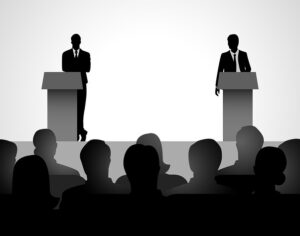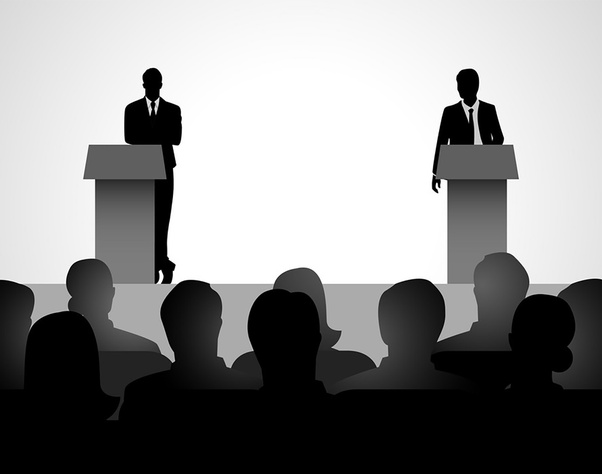Creative debate requires a willingness to embrace change, critically evaluate past and present ideas, and adapt principles to contemporary realities.
By Syed Mustafa Ahmad
Debate, defined as the formal argumentation about a particular subject, has been a cornerstone of civilized society. It allows for the thorough discussion of innovative thoughts, considering the pros and cons of various ideas. In a dynamic society, there is no static status quo; even solid truths are reinterpreted over time. This does not imply that truth ceases to be truth but rather that our approach, understanding, and behavior towards it may evolve with different periods. Creative debate plays a crucial role in identifying and rectifying societal anomalies. Conversely, some so-called debates devolve into mere noise, offering no substantive contribution. Such debates can leave the audience frustrated, leading them to disdain the concept of debate itself.
Given this dichotomy, the question arises: how can we foster creative debate while avoiding unproductive noise? What are the distinguishing features of a creative debate, and how do they differ from unconstructive arguments? Where can we find spaces conducive to creative debate? These questions are essential for anyone looking to understand the nuances between meaningful discussions and mere noise. This article aims to clarify what constitutes a creative debate and the conditions necessary for its occurrence.
Firstly, creative debate recognizes the inevitability of change in every domain of life—social, economic, political, and moral. As outdated ideas give way to new ones, our perspectives must adapt accordingly. This is where the necessity for creative debate arises. Through deliberation on the past and present, we preserve relevant truths and formulate future actions based on them, while discarding obsolete notions. A society that continuously reevaluates its history and adapts will likely experience significant progress. In contrast, a society rigidly bound to its past is at risk of stagnation.
Consider the example of Muslims, who regard the Qur’an as the ultimate constitution. Its principles are unalterable and applicable to all ages. However, the Qur’an also encourages decision-making that considers contemporary contexts. It advocates for adapting its timeless principles to present circumstances. Despite this, orthodox individuals often resist change, labeling it blasphemy. This resistance poses a significant barrier to creative debate.

The second prerequisite for fostering creative debate is the willingness to learn from others. Embracing this attitude opens the door to truly innovative discussions. A prejudiced mind is closed off, unable to replace outdated thoughts with new, relevant ones, thereby hindering the smooth functioning of creative debates. Historically, Muslims learned philosophy from the Greeks, while the world benefited from Islamic contributions to hygiene, equality, scientific inquiry, and broad-mindedness. This exchange underscores the importance of a give-and-take approach. Problems arise when a society isolates itself and exaggerates its own achievements without considering external perspectives. Every historical event leaves its mark, but the key is to learn, discuss, and adopt the best principles from each other.
The third prerequisite is to avoid judging a book by its cover. At first glance, something might seem unappealing, but deeper investigation often reveals its true value. Modern society frequently errs in this regard, assessing groups of people based on outward appearances without delving deeper to find the underlying worth. Consider coal: a black, seemingly unremarkable substance, yet within it can lie a diamond. Similarly, within every community, there are reasonable and insightful individuals whose potential contributions are often overlooked due to superficial judgments. These individuals dislike the pervasive noise that stifles meaningful discourse. Without their input, the quality of debates suffers significantly. Thus, recognizing and engaging these voices is crucial for effective debates.
The fourth and final prerequisite is preparing the general populace for meaningful debate. Currently, many people are unprepared; their minds are barren, biased, and filled with irrelevant or misleading information. This mindset needs to be erased, making way for a new initiative that fosters the generation of new ideas. People often mistake noise for genuine debate, but they must be taught to distinguish between the two. Noise is generated by those with superficial knowledge, who lack a deep understanding of the issues. Educating the public on this distinction can significantly boost the quality of debates.
It is evident that we must be open to learning everything beneficial according to divine principles. We should embrace principles that unite humanity and reject those that cause division. To make our world a better place, we have a long way to go, and the journey is fraught with challenges. Intellectualism must prevail so society can differentiate between creative debate and mere noise. Let us strive to cultivate an environment where thoughtful, innovative discussions can flourish, driving progress and unity.
Creative debate requires a willingness to embrace change, critically evaluate past and present ideas, and adapt principles to contemporary realities. It thrives in environments where open-mindedness and flexibility are valued. Conversely, unproductive debates, characterized by noise and resistance to change, hinder societal progress. Understanding and fostering the conditions for creative debate is essential for any society aiming to evolve and thrive.
The views expressed in this article are solely those of the author and do not necessarily reflect the opinions or views of this Magazine.
Blurbs
This mindset needs to be erased, making way for a new initiative that fosters the generation of new ideas. People often mistake noise for genuine debate, but they must be taught to distinguish between the two.

Leave a Reply